AUGUSTA — A standing-room-only crowd gave impassioned testimony to the Legislature’s Health and Human Services Committee on Monday, arguing for and against restrictions that would make it harder to opt out of childhood vaccinations.
Maine has one of the highest voluntary opt-out rates in the nation, and public health experts have warned that the levels of unvaccinated children could result in the return of vaccine-preventable diseases such as measles, pertussis, polio and mumps. The issue has attracted national attention since this winter’s measles outbreak at Disneyland in California.
Two bills before the committee would target the philosophic exemption, which is used by more than 90 percent of parents who choose to not vaccinate their children. Vaccines are a requirement for entering school, but Maine has one of the more lenient laws in the country for opting out, based on how easy it is for parents to forgo immunizations, public health experts say. In Maine, parents can simply sign a form opting out on religious or philosophic grounds.
One bill, sponsored by Rep. Linda Sanborn, D-Gorham, a retired family physician, would require a consultation and a signed note from a medical professional before parents could use the philosophic exemption to forgo vaccines for their children entering kindergarten. A second bill, from Rep. Ralph Tucker, D-Brunswick, would eliminate the philosophic exemption. The religious exemption would remain unchanged under both bills.
DISAGREEMENT, DUELING STICKERS
Shannon Gervais of Buxton said her elementary-age son suffers from a compromised immune system. A host of medical problems starting when he was a baby has weakened his lungs, she said, making him susceptible to infectious diseases. Gervais urged lawmakers to make it more difficult for parents to opt out of vaccines.
“Whooping cough to some people could be an annoyance, but it could kill my child. I truly rely on other families making sure their children are vaccinated in order to protect my son and our family from a terrible tragedy,” Gervais said.
Maine has reported a surge in pertussis cases in recent years, and experts partly attribute the increase to more unvaccinated children, but it is also caused by the effectiveness of the pertussis vaccine waning over time.
At the hearing, pro- and anti-vaccination groups wore dueling stickers. The ones worn by anti-vaccine advocates carried the message: “Where there is risk, there must be a choice.” People who support vaccines displayed stickers saying: “I support healthy kids, healthy families, healthy communities.”
Public health advocates say vaccinations are more than just a personal choice, because of the effects on the community. Greater percentages of unvaccinated people can weaken “herd immunity” and spread diseases not only to other unvaccinated people, but also to those too young to be vaccinated and those who have weakened immune systems from other illnesses.
VACCINES SAFE, OR POSE A RISK?
Robert F. Kennedy Jr., the son of the late U.S. attorney general and presidential candidate, was a guest of anti-vaccine organizers.
Kennedy said he is “pro-vaccine,” but he opposed the bills proposed by Sanborn and Tucker, railed against the U.S. Centers for Disease Control and Prevention and cast doubt on the safety of vaccines.
“This (use of vaccines) is not a risk-free enterprise. It’s a risky medical intervention,” said Kennedy, an attorney who has written a book about vaccine safety. He has traveled to various states arguing against stricter vaccine laws.
Kennedy said the state should not “turn the children in the state of Maine over to the vaccine industry.”
But those representing the medical community said overwhelming scientific evidence shows the vaccines are safe, do not cause autism and have eradicated infectious diseases that plagued families decades ago.
“Most of today’s parents cannot recall a time when one in 10 babies died before their first birthday from infectious disease. Just one generation ago, polio ravaged our country,” said Dr. Deborah Hagler, a pediatrician from Martin’s Point Health Care in Brunswick. “The objections to vaccines are misguided and ignore established science and endanger us all.”
Holly Lusk, a health policy adviser for Gov. Paul LePage, hailed the success of vaccines in reducing or eliminating infectious diseases, but said the administration was opposed to the bills because “parents must have a choice.”
Sanborn said her bill still gives parents a choice, but it is a more informed choice after talking with a health professional.
One reason some parents have become worried about vaccines is a study from 1998 that claimed there was a link between autism and vaccines. The study was debunked and retracted, and thousands of subsequent research papers have disproved any connection, but fears persist.
Dr. Donald Burgess, a Kennebunk pediatrician who cares for more than 200 autistic children, said that even though many families of autistic children are wary of vaccinations, consultations work.
“Many of my families have initial concerns about vaccines, but many of them choose to fully immunize their children based on the scientifically based education I provide to them,” Burgess said.
Tucker, the Brunswick legislator, said Maine must not permit the infectious diseases to return. He said he has personally seen friends and family members sickened by the diseases.
“Vaccination is a matter of civic responsibility, a social compact,” Tucker said.
PERSONAL STORIES ON VACCINES
In 2013-14, Maine had the fifth-highest voluntary opt-out rate in the country – 5.2 percent of students entering kindergarten.
Parents who argued against the bills related personal experiences in which they say their children were harmed by vaccines, including cases of autism and seizures.
Jodi Stebbins of Augusta said her 7-year-old son, Green Harrington, was progressing normally at age 2 when he received his scheduled vaccinations. A few days later, he backtracked and is now diagnosed as autistic.
“The doctors told me it was not related to the vaccines, that it was a coincidence,” Stebbins said. “But I saw it with my own two eyes, and this happened to my baby.”
Stebbins is against removing the philosophic exemption, but is not opposed to Sanborn’s bill, requiring a consultation.
BILL CALLED ‘A COERCIVE MEASURE’
Ginger Taylor, who helped organize the opposition to the vaccine bills, said the consultation bill is akin to the state saying, “You’re a bad parent.”
She said the state would be telling parents who choose not to vaccinate that “their decision to forgo a vaccine is a wrong decision. So wrong in fact that they need to be forcibly counseled on it, and that their bad parenting is being documented and placed in their permanent file. This is a coercive measure.”
Taylor worked with Rep. Beth O’Connor, R-Berwick, on another bill that would create a new state program that would investigate vaccine injury claims. The bill, also part of Monday’s public hearings, has been criticized by public health experts as a scare tactic and it’s opposed by the LePage administration.
Send questions/comments to the editors.



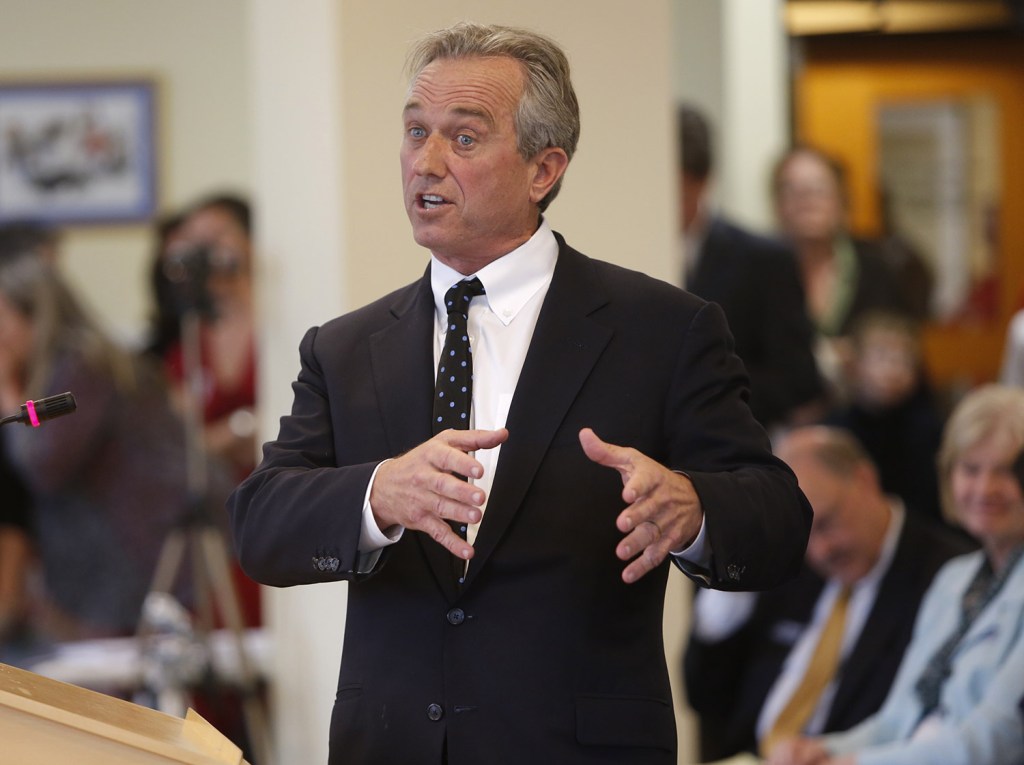
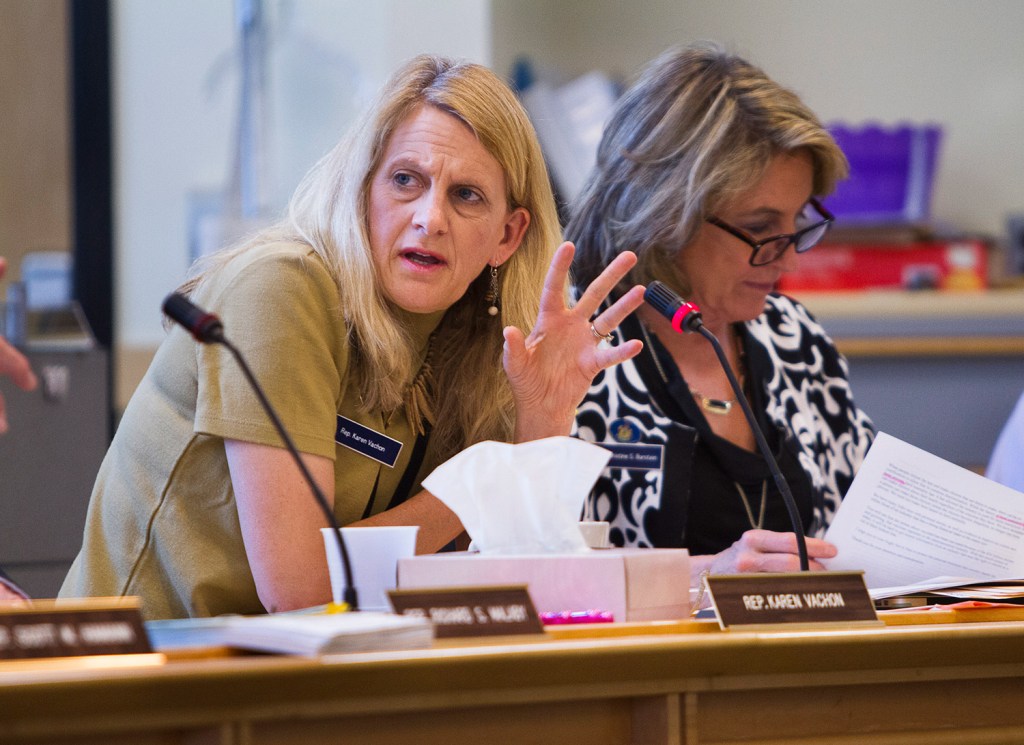
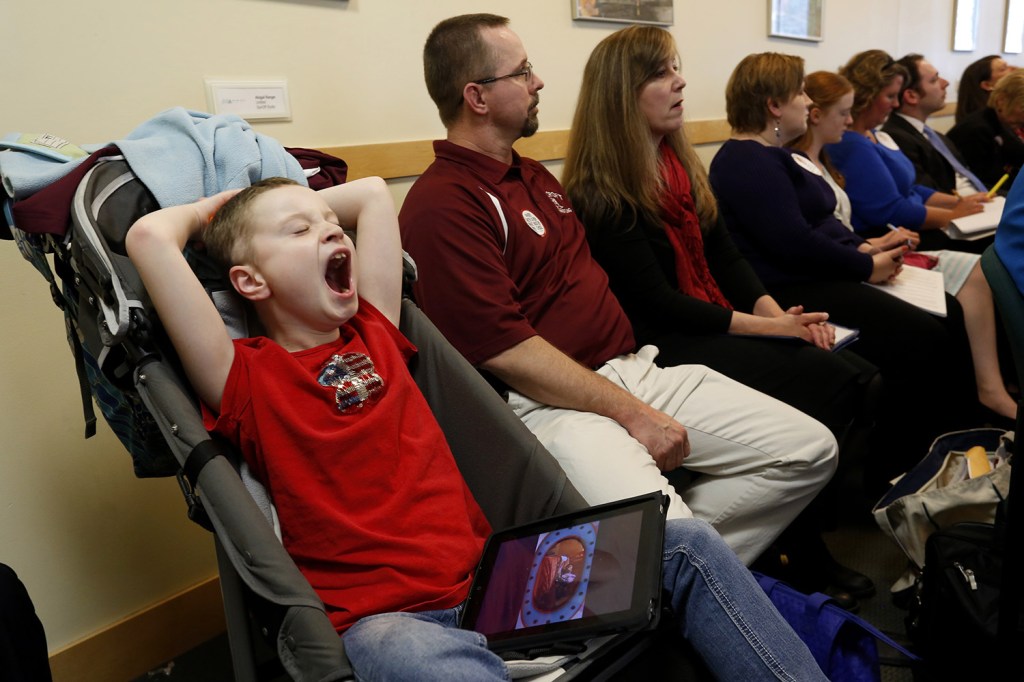
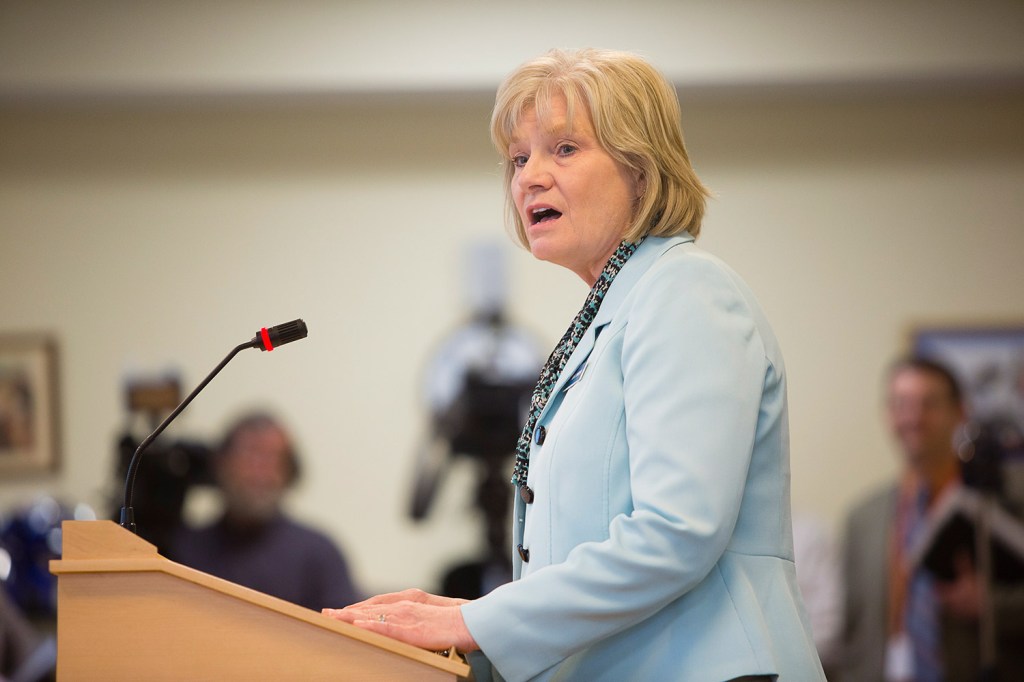
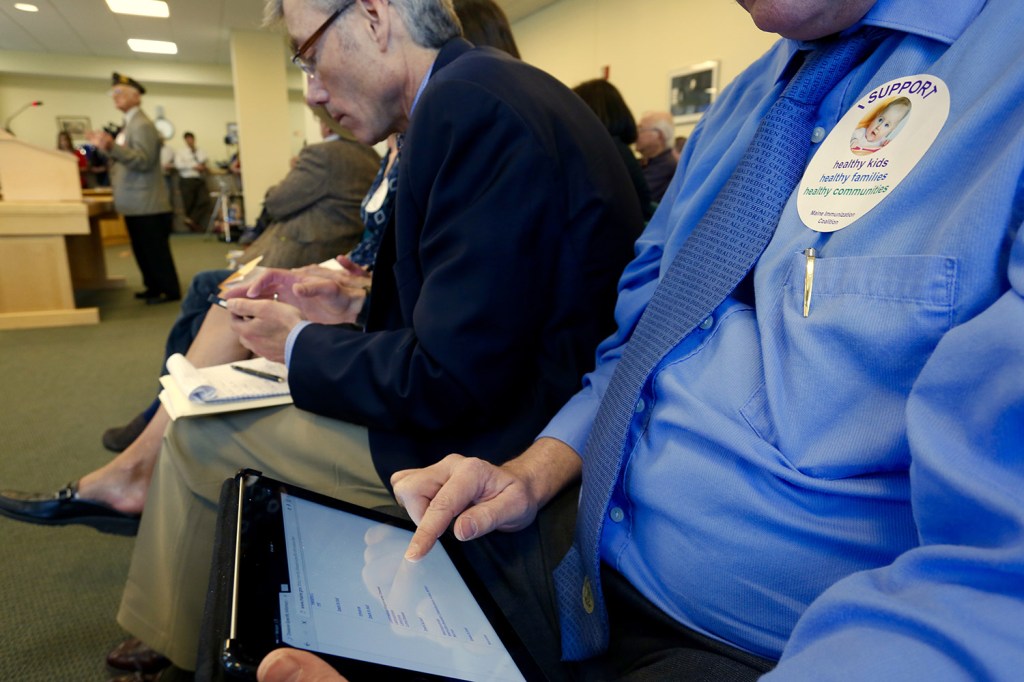
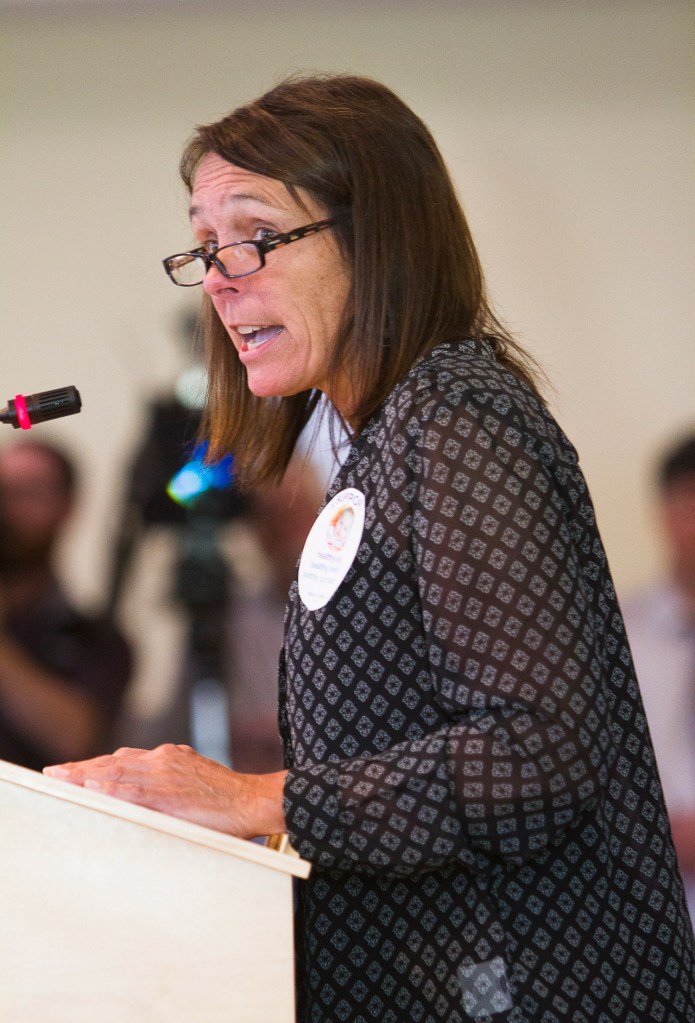

Success. Please wait for the page to reload. If the page does not reload within 5 seconds, please refresh the page.
Enter your email and password to access comments.
Hi, to comment on stories you must . This profile is in addition to your subscription and website login.
Already have a commenting profile? .
Invalid username/password.
Please check your email to confirm and complete your registration.
Only subscribers are eligible to post comments. Please subscribe or login first for digital access. Here’s why.
Use the form below to reset your password. When you've submitted your account email, we will send an email with a reset code.